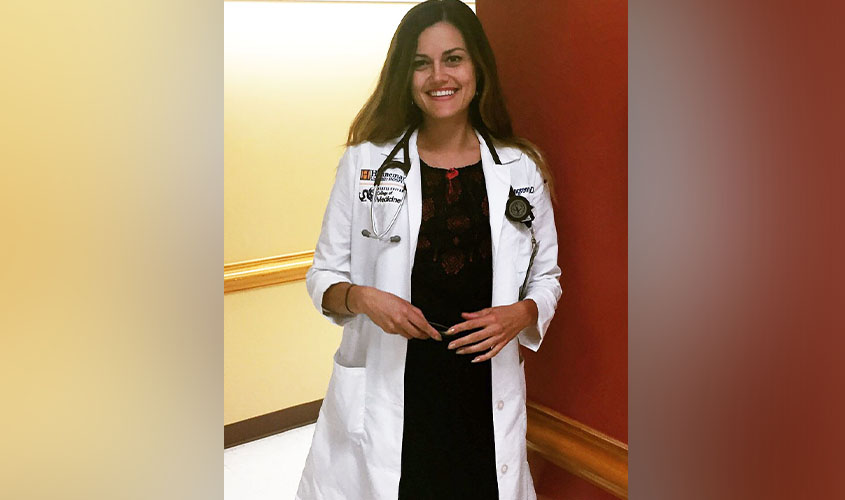International medical and humanitarian assistance groups and volunteers from around the world have been traveling to border cities to provide aid and medical care to Ukraine refugees, including Dr. Mariya Vengrenyuk, a 2016 graduate of St. George’s University School of Medicine.
Dr. Vengrenyuk splits her time as a travel hospitalist and as a clinical investigator working on vaccine trials for pharmaceutical product development. She was born in the Ukraine and moved to the US when she was nine.
Feeling an emotional pull to help her native country’s people, Dr. Vengrenyuk has traveled to the Poland-Ukraine border at Przemysl with SSF-Rescuers Without Borders, a medical relief agency dedicated to help people in distress. Following her work with SSF, she will also visit her hometown of Ivano-Frankivsk, Ukraine with the organization, Revived Soldiers Ukraine.
Before leaving, Dr. Vengrenyuk shared why she wanted to offer her services in this capacity and how her training at SGU prepared her for this journey.
St. George’s University: How did you get involved with both organizations?
Dr. Vengrenyuk: I learned about SSF through my colleagues. A few doctors from Philadelphia that I know from residency training volunteered with SSF in March 2022.
As for Revived Soldiers Ukraine, I have been volunteering with this organization for the last few years. I traveled to Ukraine in the summer of 2021 twice. We opened a physical therapy rehabilitation in Irpin (a city outside Kyiv that was heavily shelled recently). Our rehab still stands now that Russian troops retreated from this area.
We have been bringing wounded soldiers to the US. Our organization president finds hospitals who treat them pro-bono or we purchase health insurance to help cover surgery costs.
SGU: What are you expecting to see when you get there? What kinds of tasks/treatments/aid will you give to refugees?
Dr. Vengrenyuk: I think my role will be providing urgent care type of evaluations. I speak Ukrainian, Russian, and I can understand Polish—so I can help translate medical information.
With SSF, this is a medical tent clinic that is located right at the border. Many refugees are people who left their home with minimal belongings. Some will have missed their medications for weeks. I expect to see patients with chest pain, possible URIs, diabetics with hyperglycemia or hypoglycemia, uncontrolled blood pressure, minor wounds, skin infections, etc. I know that many women have been sexually abused and some are pregnant. This is difficult to talk about, but we may be the first health personnel they encounter after these terrible experiences. I will also see many people with acute stress disorders, anxiety, depression, and PTSD.
SGU: How have you emotionally prepared for the trip?
Dr. Vengrenyuk: I am glad I did not fly there in February or March. At that point I was in a state of shock, I was crying every day. I needed to learn to cope with the war myself before I could go and provide care to others impacted.
SGU: Why do you feel it was important for you to volunteer in this capacity?
Dr. Vengrenyuk: I am in a position to help. I speak the language. I understand where these people come from. I have medical training. It may not be combat training—but I think any medical background will help during moments like these. I am young, healthy, I do not have a family of my own, I feel I am in a position to give back. I can also help financially. I was lucky to have moved to the US at age nine when my parents won the green card. Had we still lived in Ukraine—we could have been the ones crossing this same border as refugees.
SGU: How has your training at SGU prepared you for this type of medical assistance?
Dr. Vengrenyuk: SGU was an incredible experience, I am very proud that I went to SGU. It opened a world of opportunities for me. First of all, going to Grenada was the first time I left my parent’s home. In college, I lived with my parents. It was a brave first step to pursue my dream and try something unknown.
I think my SGU experience prepared me to always be ready for new opportunities and to learn to adapt quickly. I made many connections at SGU with doctors who now practice all over the world. I stay in touch with several SGU graduates.
SGU: What kind of characteristics/traits does a doctor need to have to function in a war-zone environment?
Dr. Vengrenyuk: I think you need to be brave, rational, and selfless. I love people in general and if I can lessen their pain, whether physical or emotional, I will try my best to do it.
Also, you need to be compassionate but not emotional. You need to be ready to see and hear terrible stories but not let it impact you to the point where you cannot help. You need to be open to learn new skills quickly.
SGU: Anything else you would like to share about the trip?
Dr. Vengrenyuk: I plan to do more trips like this, hopefully I can go back to the Ukraine in August.
— Laurie Chartorynsky
Related Reading
SVM grad helps refugees and their pets on Ukraine-Poland border
SGU grad secures ultrasound units to aid Grenada’s fight against breast cancer
SGU alum named attending “Physician of The Year” at UCSD
The post Ukraine-born grad travels to Poland to help refugees in need appeared first on St. George’s University.

Leave A Comment